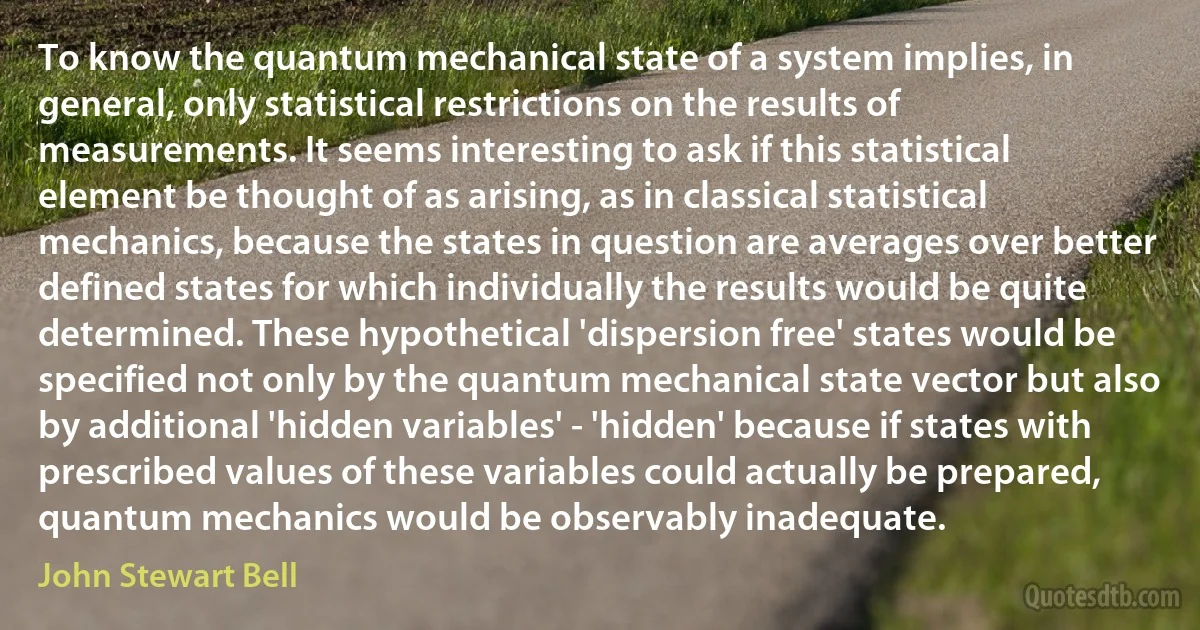
To know the quantum mechanical state of a system implies, in general, only statistical restrictions on the results of measurements. It seems interesting to ask if this statistical element be thought of as arising, as in classical statistical mechanics, because the states in question are averages over better defined states for which individually the results would be quite determined. These hypothetical 'dispersion free' states would be specified not only by the quantum mechanical state vector but also by additional 'hidden variables' - 'hidden' because if states with prescribed values of these variables could actually be prepared, quantum mechanics would be observably inadequate.
John Stewart BellRelated topics
additional ask classical dispersion element free general hide hypothetical mechanics quantum question quite state thought vector StatesRelated quotes
Steal music from napster while you have the chance. find free porn on the internet. sneak across the border into mexico just for the irony. how come every one on the internet is "hot"? tell your parents the truth. start your own army. adopt a dog. tell your children the truth. stop complaining and go out and do something about it. jump out of a fucking plane. stop reading this crap right now. don't listen to me. i don't have any answers and i stole the questions from someone else. read a good book. dont beat yourself up. question authority but don't forget to do what your told. turn off your computer right now and go outside and let people into your life.

Jared Leto
Given my interest in the concept of time, it was only natural that my attention was focused on the second principle, as I felt from the start that it would introduce a new, unexpected element into the description of physical world evolution. No doubt it was the same impression illustrious physicists such as Boltzmann and Planck would have felt before me. A huge part of my scientific career would then be devoted to the elucidation of macroscopic as well as microscopic aspects of the second principle, in order to extend its validity to new situations, and to the other fundamental approaches of theoretical physics, such as classical and quantum dynamics.

Ilya Prigogine
In relativity, movement is continuous, causally determinate and well defined, while in quantum mechanics it is discontinuous, not causally determinate and not well defined. Each theory is committed to its own notions of essentially static and fragmentary modes of existence (relativity to that of separate events, connectable by signals, and quantum mechanics to a well-defined quantum state). One thus sees that a new kind of theory is needed which drops these basic commitments and at most recovers some essential features of the older theories as abstract forms derived from a deeper reality in which what prevails in unbroken wholeness.

David Bohm
A commander in chief sends America's sons and daughters into battle in a foreign land only after the greatest care and a lot of prayer. We ask a lot of those who wear our uniform. We ask them to leave their loved ones, to travel great distances, to risk injury, even to be prepared to make the ultimate sacrifice of their lives. They are dedicated. They are honorable. They represent the best of our country, and we are grateful. To all the men and women in our military, every sailor, every soldier, every airman, every coast guardsman, every Marine, I say this: Your mission is defined. The objectives are clear. Your goal is just. You have my full confidence, and you will have every tool you need to carry out your duty.

George W. Bush
No one mentioned Communism or the Hiss Case until we sat over our coffee in the living room. Mrs. Philip Jessup had just used her personal good offices to try to get me off TIME. Luce was baffled by the implacable clamor of the most enlightened people against me. "By any Marxian pattern of how classes behave," he said, "the upper class should be for you and the lower classes should be against you. But it is the upper class that is most violent against you. How do you explain that?" "You don't understand the class structure of American society," said Smetana, "or you would not ask such a question. In the United States, the working class are Democrats. The middle class are Republicans. The upper class are Communists."

Whittaker Chambers
